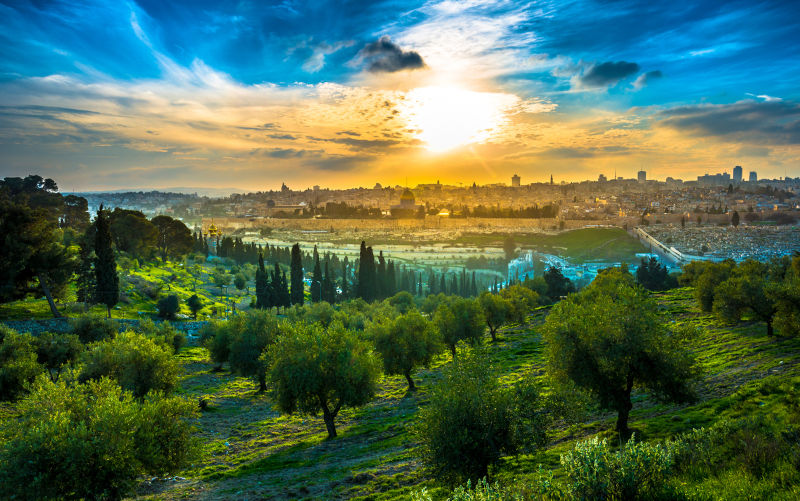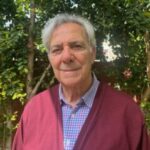In Northumbria, a majestic Sycamore Gap Tree has flourished at the site of Hadrian’s Wall for some 300 odd years. Last week it was cut down by some vicious, uncaring vandal. From the moment the trunk of that beautiful old tree hit the ground the thud of destruction turned into a thunder of condemnation across the world. The people who committed this heinous crime should be punished to the full extent of English law. But, what about the people who have destroyed, uprooted or burnt one million trees in Palestine?
This is not a whimsical piece, or even a religious one. It is about a tree, The Olive Tree, that has been planted, tended and harvested by Palestinians for millennia. Our olive trees are literally thousands of years old. Twisted and wrought by nature, they still produce their magnificent fruit, which is sacred to us Palestinians, giving us everything we need.
The golden nectar that pours down from the cold presses in every town and village is a joy to behold and taste – and eventually, sell. It is our life-blood, our income. The crushed stones are collected and gathered to use for winter fuel. Our women rub olive oil into their skin, to protect them from the sun and give them that special, Palestinian glow. Going with my mother, as a child to a nearby village, called Arrabah where we took our olives to the press to be processed is one of my favourite memories. We call it the liquid of life, because olive oil in Palestine is not only income and a vital ingredient in all our dishes, it’s used for every ailment you could think of by our mothers, aunties, grannies and sisters. One of the staple diets is ‘zeit and za’tar’ – olive oil and thyme, which I still eat, regularly for breakfast or a snack, even though I left Palestine 60 years ago.
Why all this nostalgia?
Because the olive harvest in Palestine has just started. I’ll never forget how we children used to be allowed days off school to go and help. I would sit on the floor in our kitchen, washing the fruit, picking off any stray leaves, and then the pickling of the olives would begin, piled into cool, earthenware jars.
Those scenes have long gone. The harvest does continue, but at a fraction of the pace and the yield that I recall. Since our land was occupied by the Zionists and their feral, so-called settlers in the West Bank, the olive groves, the olive growers and the land have been besieged, uprooted, burnt and looted.
Since 1967 over 1,000,000 olive trees have been demolished by Israeli settlers and their supporters.
A Palestinian farmer, following in the footsteps of his father, his father’s father and his father before that is now severely restricted from accessing his olive groves to tend, toil, prune and eventually harvest. A Palestinian olive grower must have a pre-written permit from the occupying power to access his land and complete the harvest. Those permits may be eventually granted, but only after a wait that seems interminable. Not only that, the Israeli authorities allow the so-called settlers to create havoc and steal the harvest, while the Israeli soldiers look the other way.
You don’t have to take my word for this. An Israeli NGO, Yesh Din itemises, horror by horror, this relentless annual savagery in their summary of 2021 Olive Harvest Season.
I quote: “Every year during the olive harvest season there is a wave of violent attacks, theft of crops and damage to or destruction of trees. Violence and vandalism committed by Israeli settlers is a continuous phenomenon and does not only occur during the olive harvest season.”
Their researchers reported 42 offences committed by Israeli citizens against Palestine residents during the Olive Harvest Season, while pointing out that other offences were also committed against Palestinians and their property that were not related to the olive harvest, and therefore were not included in this report.
13 of the 42 offences were related to violence, 17 to crop theft, 12 incidents of damage and destruction of trees, 4 incidents in which access to private land was denied. Yet, just 0.87% of complaints concerning suspected Israeli soldier offences against Palestinians led to the filing of indictments. 81.5% of investigative files on ideological crimes against Palestinians were closed due to police failure. Just 7% of investigations into ideological crimes against Palestinians led to the filing of indictments.
Have you heard of this? Did your media ever report on it? Has anybody in the western world cried ‘foul’? Somehow I doubt it.
Meanwhile, across the world in Northumbria, North East England, a majestic Sycamore Gap Tree has flourished at the site of Hadrian’s Wall for some 300 odd years. Last week it was cut down by some vicious, uncaring vandal.
From the moment the trunk of that beautiful old tree hit the ground the thud of destruction turned into a thunder of condemnation across the world, mourning the loss of such a national treasure. Quite rightly so. We walked around that tree, my wife and I, and we obviously saw it in the famous opening scene of Kevin Costner’s movie, “Robin Hood, Prince of Thieves”. A tragedy indeed. And the people who committed this heinous crime should be punished to the full extent of English law.
But, what about the people who have destroyed, uprooted or burnt one million trees in Palestine? What punishment would you think fits this crime?
Where is the outcry?
Or have we reached the stage, in this ‘civilised world’ of ours where compassion is orchestrated according to political expediency and self interest? What a shame.
Jafar M Ramini is a Palestinian writer and political analyst. He was born in Jenin in 1943 and was five years old when he and his family had to flee the terror of the Haganah Militia. He lived in London for 53 years before coming to Perth four years ago. Justice for the people of Palestine is a life-long commitment.

